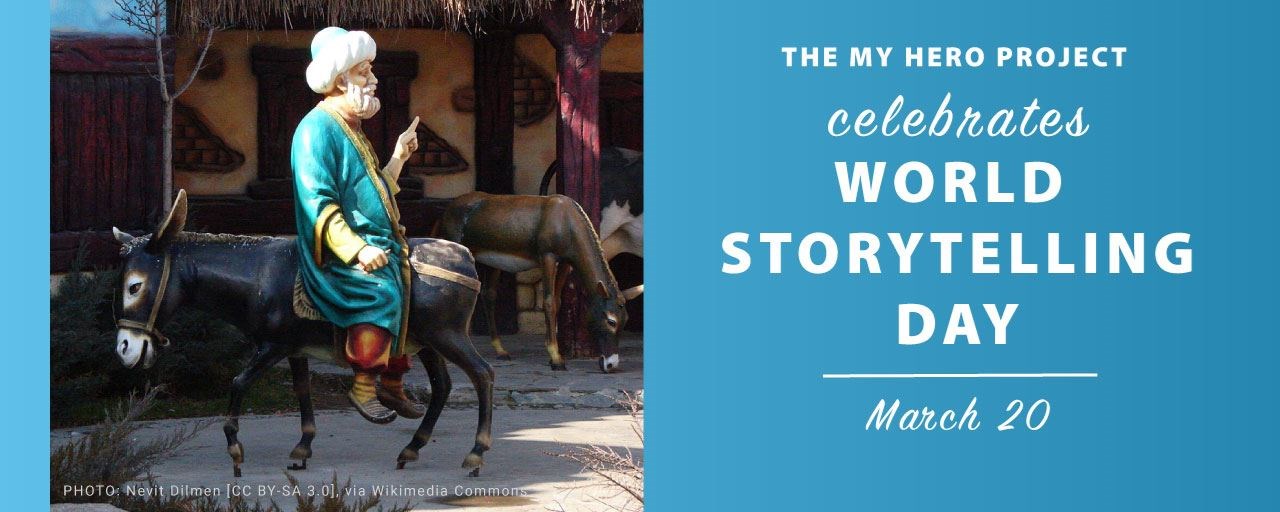
World Storytelling Day celebrates the art of oral storytelling from all over the world.
The holiday began in 1991 in Sweden as "All Storytellers Day" and grew to become a global community of people who listen to and tell as many stories as possible, in as many languages as possible to connect with and learn from each other.

Inspired by the original Native American legend, this story is about sacrifice and community.
Wangari Maathai shares a simple story to illustrate a powerful point.

Each year a theme is selected for World Storytelling Day. In 2018 the theme is "the wise fool," which is a literary archetype. An archetype is a figure that occurs time and time again in literature or mythology, as you'll see below.
The wise fool can be a clown, a court jester or someone who seems simple or foolish--but surprises us by being wise and speaking the truth. The character of the wise fool occurs in different cultures and throughout literary history. They can also be intentionally or unintentionally funny!
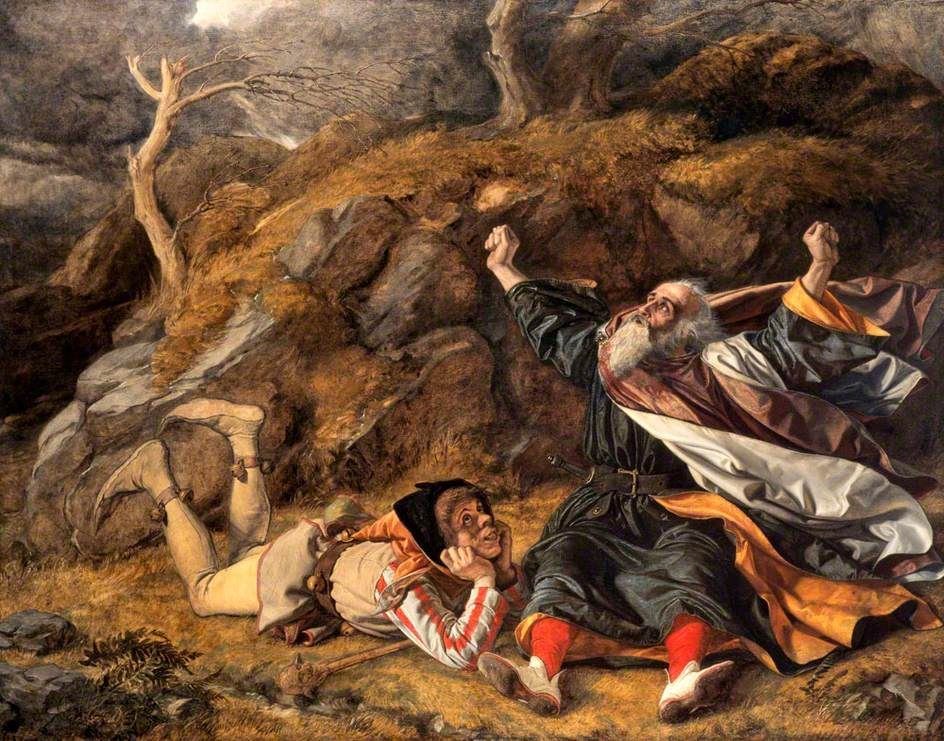
"Thou shouldst not have been old
till thou hadst been wise."
- the Fool, King Lear
Although fools had appeared throughout early English literature, it was Shakespeare who truly developed the archetypal fool. Shakespeare's fools often speak wisdom to the powerful--something the king's subjects might be afraid to say. For example, in the tragedy King Lear, the fool tells the king he should have become wise before he became old.
In Shakespeare's plays, there are probably over 20 characters who play the part of a fool. Some of the most famous are Feste in the play Twelfth Night, and the Fool in King Lear.
Feste sings this song: "O Mistress Mine" in Shakespeare's Twelfth Night:
"What is love? 'Tis not hereafter.
Present mirth hath present laughter;
What's to come is still unsure.
In delay there lies no plenty,
Then come kiss me, sweet and twenty:
Youth's a stuff will not endure."
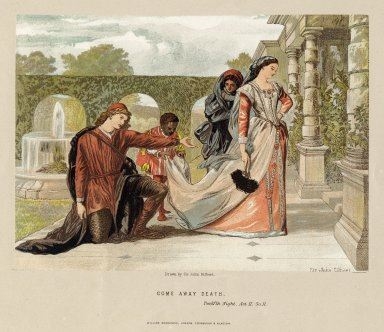
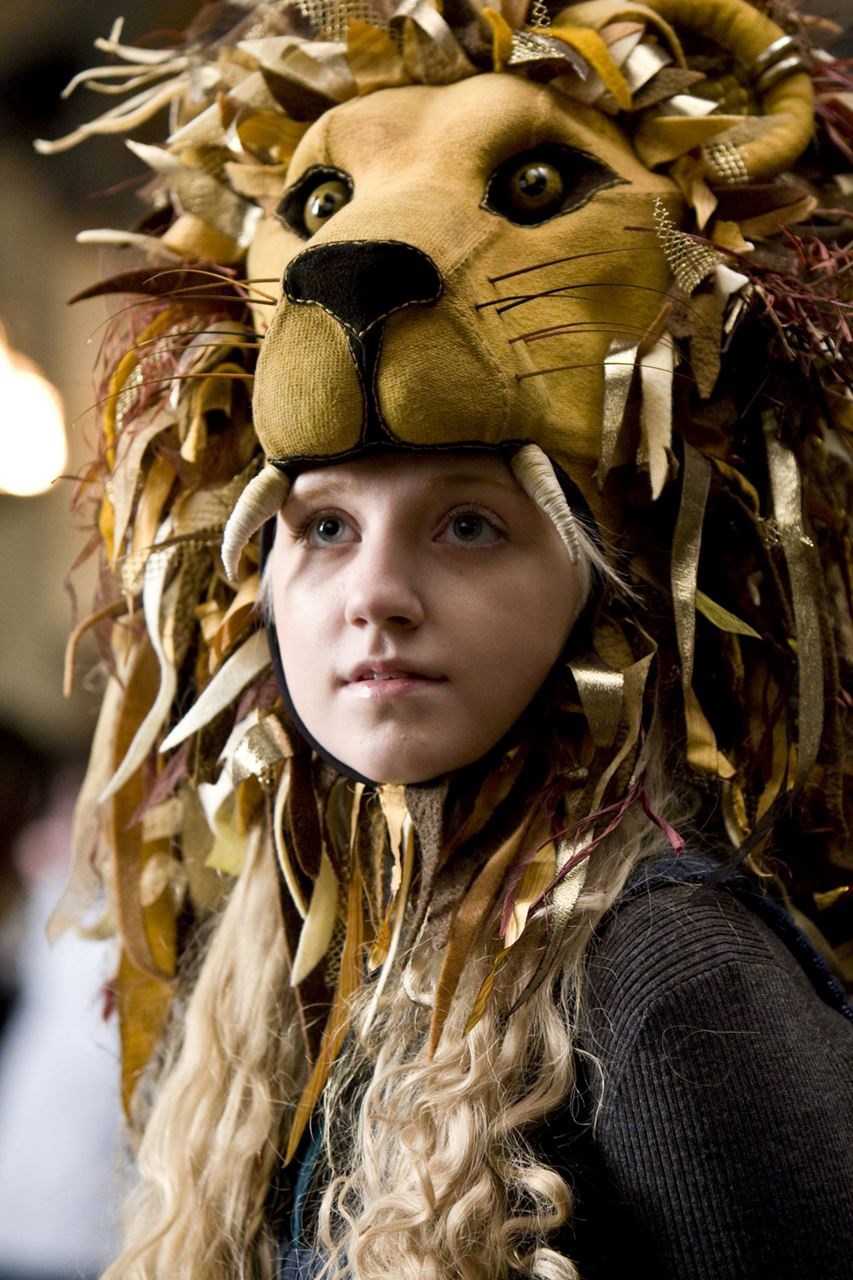
A recent example of a wise fool is Luna "Loony" Lovegood in the Harry Potter series. Although she seems strange, from her lion Gryffyndor hat to her crazy glasses or reading magazines upside down, she often says things that are true:
Ravenclaw Common Room: “Which came first, the phoenix or the flame?”
Luna: "I think the answer is that a circle has no beginning."
Another wise fool is one of the characters in The Lord of the Rings: "Samwise" means "half-wise." And yet, Gandalf says of the mission to destroy the Ring: "There was never much hope. Only a fool's hope." Compared to the wise elves or the dark magic of Sauron, Samwise Gamgee doesn't seem very smart. He longs for the simple pleasures of his hobbit home. But he is th one who gets up and continues into Mordor, and without him Frodo could not have destroyed the Ring and saved Middle Earth.
Frodo: Go back, Sam! I’m going to Mordor alone.
Sam: Of course you are, and I’m coming with you!

Nasreddin Hodja was a real person born in Turkey circa the 13th century, who became part of Turkish folklore. He appears in thousands of stories, usually funny, which teach a lesson. Here is a funny example:
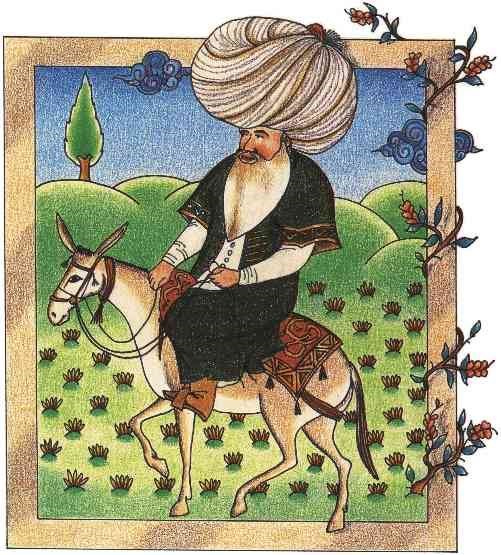
Nasreddin was walking in the bazaar with a large group of followers. Whatever Nasreddin did, his followers immediately copied.
Every few steps Nasreddin would stop and shake his hands in the air, touch his feet and jump up yelling "Hu Hu Hu!". So his followers would also stop and do exactly the same thing.
One of the merchants, who knew Nasreddin, quietly asked him: "What are you doing my old friend? Why are these people imitating you?"
"I have become a Sufi Sheikh," replied Nasreddin. "These are my Murids [spiritual seekers]; I am helping them reach enlightenment!"
"How do you know when they reach enlightenment?"
"That’s the easy part! Every morning I count them. The ones who have left – have reached enlightenment!"
(Source: Wikipedia)
Ivan the Fool appears throughout Russian folklore and literature, starting in the 16th century. He is simple but lucky and usually the youngest of three brothers. He is characterized by being generous and forgiving towards others. At first this seems foolish, but it usually leads to a happy ending.
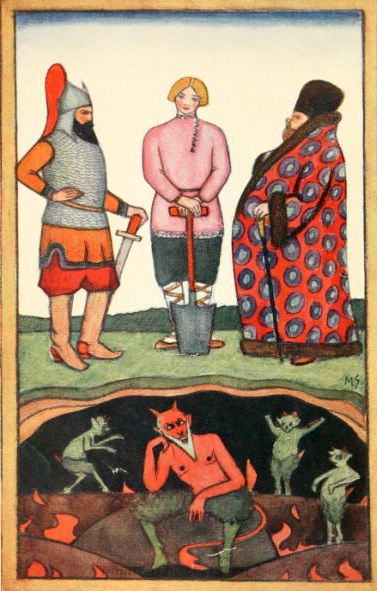
In the novel Don Quixote, by Miguel de Cervantes, the wise fool character Sancho Panza is Don Quixote's squire. He is a simple farmer, and is the butt of many jokes, but it turns out he can see reality more clearly than Don Quixote. In part two of the novel, Sancho becomes a governor and amazes everyone with his wise judgements when he settles disputes.
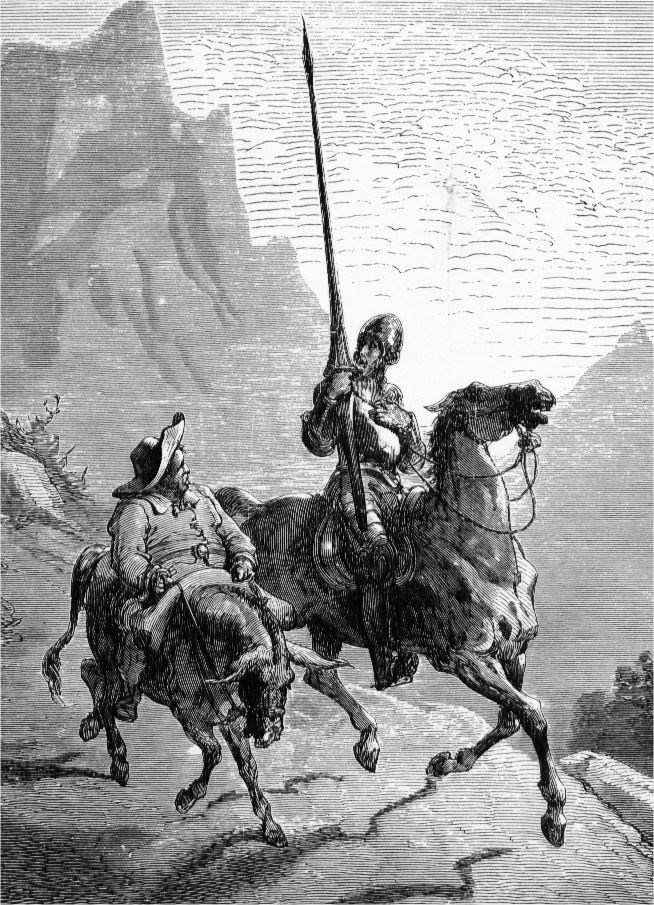
From Don Quixote (Advanced Reading Level)
"At this instant there came into court two old men, one carrying a cane by way of a walking-stick, and the one who had no stick said, "Senor, some time ago I lent this good man ten gold-crowns in gold to gratify him and do him a service, on the condition that he was to return them to me whenever I should ask for them. A long time passed before I asked for them, for I would not put him to any greater straits to return them than he was in when I lent them to him; but thinking he was growing careless about payment I asked for them once and several times; and not only will he not give them back, but he denies that he owes them, and says I never lent him any such crowns; or if I did, that he repaid them; and I have no witnesses either of the loan, or the payment, for he never paid me; I want your worship to put him to his oath, and if he swears he returned them to me I forgive him the debt here and before God."
"What say you to this, good old man, you with the stick?" said Sancho.
To which the old man replied, "I admit, senor, that he lent them to me; but let your worship lower your staff, and as he leaves it to my oath, I'll swear that I gave them back, and paid him really and truly."
The governor lowered the staff, and as he did so the old man who had the stick handed it to the other old man to hold for him while he swore, as if he found it in his way; and then laid his hand on the cross of the staff, saying that it was true the ten crowns that were demanded of him had been lent him; but that he had with his own hand given them back into the hand of the other, and that he, not recollecting it, was always asking for them.
Seeing this the great governor asked the creditor what answer he had to make to what his opponent said. He said that no doubt his debtor had told the truth, for he believed him to be an honest man and a good Christian, and he himself must have forgotten when and how he had given him back the crowns; and that from that time forth he would make no further demand upon him.
The debtor took his stick again, and bowing his head left the court.
Observing this, and how, without another word, he made off, and observing too the resignation of the plaintiff, Sancho buried his head in his bosom and remained for a short space in deep thought, with the forefinger of his right hand on his brow and nose; then he raised his head and bade them call back the old man with the stick, for he had already taken his departure.
They brought him back, and as soon as Sancho saw him he said, "Honest man, give me that stick, for I want it."
"Willingly," said the old man; "here it is senor," and he put it into his hand.
Sancho took it and, handing it to the other old man, said to him, "Go, and God be with you; for now you are paid."
"I, senor!" returned the old man; "why, is this cane worth ten gold-crowns?"
"Yes," said the governor, "or if not I am the greatest dolt in the world; now you will see whether I have got the headpiece to govern a whole kingdom;" and he ordered the cane to be broken in two, there, in the presence of all.
It was done, and in the middle of it they found ten gold-crowns. All were filled with amazement, and looked upon their governor as another Solomon.
They asked him how he had come to the conclusion that the ten crowns were in the cane; he replied, that observing how the old man who swore gave the stick to his opponent while he was taking the oath, and swore that he had really and truly given him the crowns, and how as soon as he had done swearing he asked for the stick again, it came into his head that the sum demanded must be inside it; and from this he said it might be seen that God sometimes guides those who govern in their judgments, even though they may be fools; besides he had himself heard the curate of his village mention just such another case, and he had so good a memory, that if it was not that he forgot everything he wished to remember, there would not be such a memory in all the island.
To conclude, the old men went off, one crestfallen, and the other in high contentment, all who were present were astonished, and he who was recording the words, deeds, and movements of Sancho could not make up his mind whether he was to look upon him and set him down as a fool or as a man of sense."
Source: SpanishArts.com

World Storytelling Day
Official Website
Organizer created on 3/17/2018 1:41:40 PM by Staff Writer
Last edited 2/28/2019 3:03:12 PM by Xenia Shin